Social Cognitive Views of Learning
Self-Regulation
Diversity
Students with special needs
students often have very structured and controlled lifestyles, making self-regulation difficult
Students at risk
students may have little knowledge on how to self-regulate
Some cultural groups place importance on certain qualities, those students will most likely acquire those attributes
Effortful control
aspect of temperament that is influenced by biology and brain maturation
Self-Regulated Problem Solving
Encourage brainstorming and creativity or provide general structures for students to follow
Effectively directing efforts to solve a complex problem
Self-Regulated Learning
Co-regulated Learning
Adult-child shared responsibility
Regulation of your own thinking and behaviors to learn
Self-Evaluation
Help-seeking
Self-monitoring
Use of Learning strategies
Attention Control
Self-Motivation
Planning
Goal Setting
Self-Regulated behavior
Most kindergarteners can sit quietly and listen when teacher is reading, but few squirm and occasionally poke their classmates
After: Self Evaluation and imposed contingencies
During: Emotion regulation, self monitoring and instruction
Before: self-determination/goals and standard
Setting goals and doing what needs to be done to achieve those goals
Self-Efficacy
Factors in the development of Self-efficacy
What others are saying
Negative/positive feedback
Current Emotional state
Previous Success and failures
Success and failures as a group
collective self-efficacy
Success and failure of others
coping models
Self-Efficacy affects behavior and cognition
Ultimately, learning and achievement
higher self-efficacy = higher learning and achievement because higher levels of engagement of cognitive processes
Effort and persistence
Goals
Choice of activites
Learners self-constructed judgement on their ability to do certain task or certain
Modeling
Essential Conditions for Successful Modeling
Motivation
Is the model relevant or appropriate for the students?
Learner have to be motivated to model the behavior
Motor Reproduction
A first grade won't be able to play softball like a teenager
Learners should be able to reproduce the modeled behavior
Retention
Presenting students with both a visual and verbal representation
Learners have to remember the model
Attention
Science Lab or experiment
Learners have to pay attention to the model
Characteristics of Effective Models
Relevancy to learner
Students will adopt behaviors useful to them
Prestige or Power
Local leaders or renowned athlete
Competent of the behavior/skill in question
Students will imitate something done well rather than poorly
Behaviors and Skills that Can be learned through modeling
Interpersonal Behaviors
When students are in a discussion in small groups about book and adopt each others strategies on conducting the discussion or how to solicit others opinions
Aggression
Students learn aggression through live, verbal, symbolic models in tv, music, film, and video games
Academics
Showing students how to do long division
demonstrating how to think and do a task (cognitive modeling)
Verbal
descriptions of how to execute behaviors
Symbolic model
person or character in a book or movie
Live model
actual person demonstrating behavior
When learners observe others engaging in a particular behavior and engage in the behavior themselves
The Social Cognitive View of Reinforcement and Punishment
If a consequence to a student or a student watching doesn't occur then it can have a reinforcing or punishment effect
If a student doesn't receive the expected outcome then they may or may not work as hard next time
Expectations about future consequences influence how learners process new information
If you tell a student that what they are reading won't be on the test, they will most likely not read it or read it thoroughly
Learners expectations are influenced by what happened to themselves and other people
A student participates and doesn't win the prize but watches how the other student wins the prize and participates next time by doing what he saw the other student do
Vicarious Punishment
Vicarious Reinforcement
Students form expectations about future behaviors to behave in ways that maximize desired results
A student may believe that bragging about her test will make her classmates ridicule her so she won't do it.
Incentive
Outcome expectations
Consequences influence behaviors if students are aware of response-consequence relationship
Giving a student an A and not telling them why means they wont necessarily know how to get an A the next time
Basic Assumptions of Social Cognitive Theory
Behavior becomes self-regulated
As children grow older they increasing take charge of their lives
People and the environment influence each other
Reciprocal Causation: environmental, behavioral, and personal factors influence learning and development
the choices people make about classes or extracurricular activities affect learning opportunities and consequences
Cognitive processes influence learning motivation
setting mental goals
Learning is internal
You may see someone walk out side nude but never do it yourself
People Learn from observing others
students learning how to do long division by watching someone do it first
What and how people learn when they take control of their own behavior









